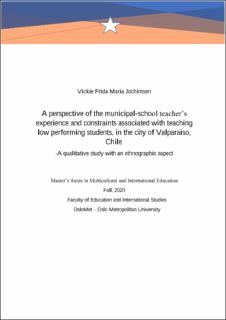A perspective of the municipal-school teacher’s experience and constraints associated with teaching low performing students, in the city of Valparaiso, Chile. -A qualitative study with an ethnographic aspect
Master thesis
Published version
Permanent lenke
https://hdl.handle.net/11250/2758965Utgivelsesdato
2020Metadata
Vis full innførselSamlinger
Sammendrag
This study contributes to qualitative research by exploring the situation of teaching vulnerable students in Valparaiso, Chile. The approach of the study recognises the interconnections between the various ecological levels in the students’ life and how they create barriers for learning, which complicate the municipal teachers’ work. The data was collected through semi-structured interviews, participant observations, semi-structured questionnaires, and informal conversations. Two teachers from different schools in Valparaiso, Chile were selected as the main informants. In addition, information from the Director of Education in Valparaiso was obtained as well as questionnaires from five additional municipal schools. The purpose of the study was to investigate the challenges affecting the teachers’ practise and the possibility to reduce them, with the aim to increase the vulnerable student’s academic results and reduce marginalisation. The study utilises the theory of ecological systems (Bronfenbrenner, 1979) and inclusive education theory. The two theories allow us to recognise how different influences from the micro,- meso,- exo,- and macro levels are interconnected, how learning barriers are created, and how these barriers affect the possibilities of inclusion at the school. The study discovered various factors at different levels that burden and complicated the municipal teachers’ work, which recognises that a systemic collaboration is needed to improve the situation. Recommendations are made to adjust the educational evaluating systems and utilise contextualised long-term research to create better guidelines to address areas of concern, such as parent participation. Furthermore, the study recommends to better allocate funding to aim to improve the vulnerable students’ social and behaviour skills as well as facilitate for the municipalities to create space for individual working methods, which should contribute to a more inclusive practice at the school.
